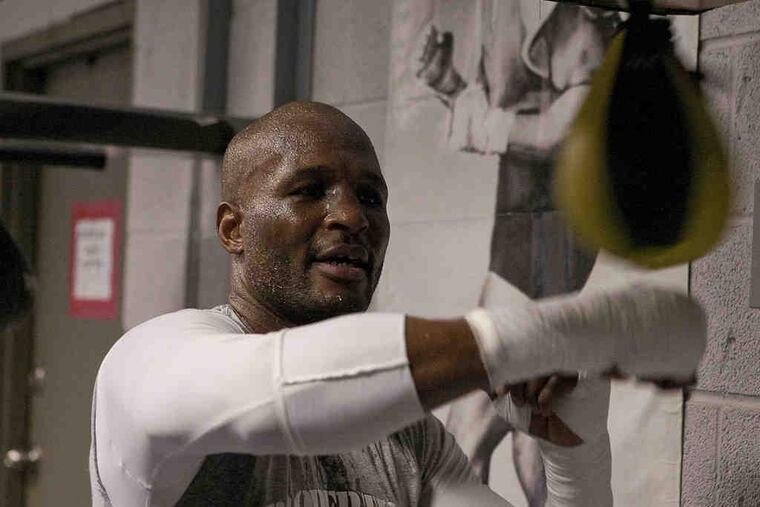Hopkins not bothered by where he'll fight, he just wants to fight
QUEBEC CITY, Quebec - From April 29, 1995, to July 16, 2005, Bernard "The Executioner" Hopkins was middleweight champion of the whole, wide world. But not once during his 10-year, 20-defense title reign did the North Philadelphia native venture

QUEBEC CITY, Quebec - From April 29, 1995, to July 16, 2005, Bernard "The Executioner" Hopkins was middleweight champion of the whole, wide world. But not once during his 10-year, 20-defense title reign did the North Philadelphia native venture outside of the United States to ply his trade, his strong preference for fighting on American soil influenced by an unpleasant experience in his second fight outside of this country, after which he vowed never again use his seldom-stamped passport to mix it up with a foreign opponent on his turf.
But personal preferences apparently can be adjusted if the money is substantial enough and a bit of rationalization goes into the thought process. That explains why Hopkins (51-5-1, 32 KOs) is breaking another of his long-standing rules by challenging WBC light-heavyweight champ Jean Pascal (26-1-0, 16 KOs), a Canadian citizen who was born in Haiti, here Saturday night before a rabidly partisan Pascal crowd.
Showtime will televise the intriguing generational matchup of Hopkins, who turns 46 on Jan. 15, and Pascal, who celebrated his 28th birthday on Oct. 28.
Before her death, Hopkins pledged to his mother, Shirley, that he would not box beyond 40. He is now contemplating the possibility of extending his Hall-of-Fame-worthy career going until he hits 50, so there is a precedent for him writing selected promises in wet sand instead of fast-drying cement.
And so it is with his decision to venture into the Great White North to duke it out with Pascal, whose popularity in Quebec guaranteed a sellout of the 16,000-seat Pepsi Coliseum and a much-larger purse for Hopkins than he could have made for the same pairing anywhere in the U.S.
Besides, Hopkins doesn't really consider this trip to be truly international in scope.
"Canada is another country, but I look at it as being a far part of New York," he explained. "If I'm going to fight anywhere out of the United States, I'd rather it be in Canada than some Third World country."
B-Hop's limited grasp of global geography isn't as outlandish as it might seem. A 2008 survey revealed that 37 percent of Americans could not locate Canada on a world map, and a National Geographic survey earlier this year stated that 50 percent of Americans between the ages of 18 and 24 couldn't pinpoint New York state on a map of the U.S.
And if that is a sad commentary on the state of education in the U.S., be advised that 5 percent of Canadians could not pinpoint the location of their own country on a world map.
Hopkins has fought twice previously in other lands. He outpointed Anibal Miranda over 10 rounds in Paris on May 21, 1992, when he still was working his way up the 160-pound rankings. His memories of the City of Lights are for the most part positive.
Not so his Dec. 17, 1994, bout with Segundo Mercado in Quito, Ecuador, for the vacant IBF middleweight title. That bout ended in a draw, necessitating a rematch, which Hopkins won on a seventh-round stoppage 4 months later in Landover, Md., which launched his long championship reign.
But he'll never forget that trip to Ecuador, and not just because he had to overcome fifth- and seventh-round knockdowns to salvage the standoff that essentially preserved his status as a top contender. Who knows what might have happened had he lost then?
To hear Hopkins tell it, he had to overcome far more than Mercado in a fight in which the deck was stacked against him far more than anything he's likely to face in Quebec. Not only was Mercado an Ecuadoran promoted by Don King, who was staging the fight, but King made arrangements for Hopkins and his travel party to arrive in Quito (elevation: 9,350 feet) only 3 days before the bout, not nearly enough time for his body to adjust to the elevation. Hopkins and his then-promoter, Butch Lewis, also complained of being booked into a "fleabag" hotel and being assigned a rundown gym to work out in that was too far away and had dog droppings on the floor.
"When we hit town, we find out the country's under martial law," Lewis said at the time. "It's a police-state kind of situation. You got guys with M-16s and Uzis everywhere you turn. And everybody's hostile toward us because we're fighting their guy."
Hopkins said he was "totally dead" in the fourth and fifth rounds because of the thin air, but his superb conditioning and refusal to be intimidated enabled him to somehow dictate the pace down the stretch and, in the estimation of Showtime announcers Ferdie Pacheco and Bobby Czyz, do enough to eke out the victory.
Let the record show that Mercado fought nine times after his losing rematch with Hopkins, going 1-7-1 before his retirement in 2003. B-Hop, on the other hand, is arguably the greatest over-40 fighter ever, an ageless wonder who still commands a high place on every list of boxing's finest pound-for-pound practicioners.
So maybe it shouldn't be held against him too much if he chooses to believe Quebec City is New York City's sixth borough. Few can pinpoint punches better than Hopkins, and maybe that's all that counts inside the ring. *